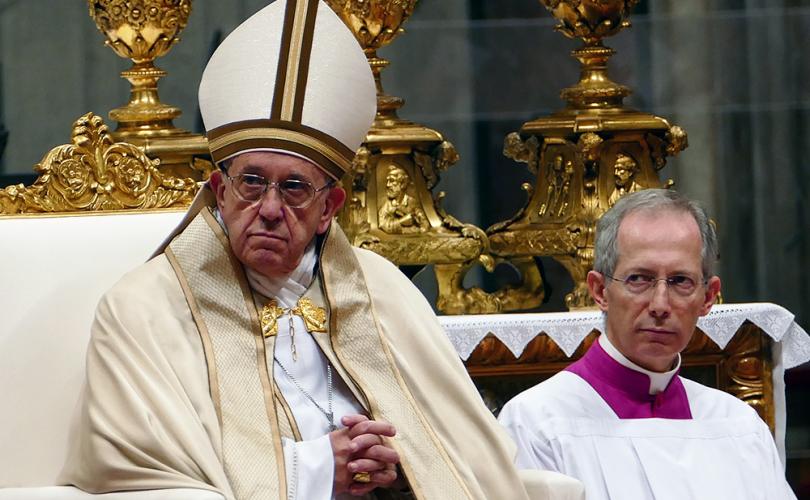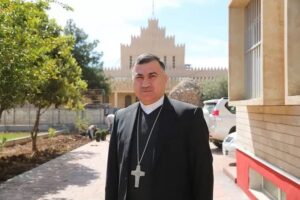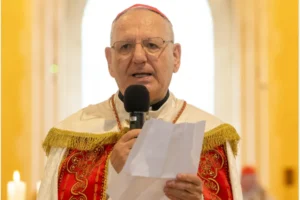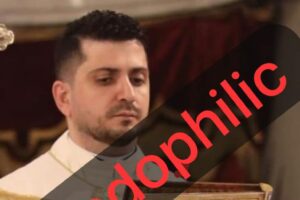September 24, 2018 (LifeSiteNews) – Pope Francis told Cardinal Gerhard Müller in 2013 to stop investigating abuse allegations against British Cardinal Cormac Murphy-O’Connor, according to a highly-placed Vatican source who spoke to Marco Tossati. Murphy-O’Connor, as a member of the “Sankt [St.] Gallen mafia,” played a pivotal role in getting Jorge Bergoglio elected Pope in 2013.
A source from England with inside knowledge of the case told LifeSiteNews that a woman alleges the cardinal had himself been involved in abusing her when she was 13 or 14 years old and that she was the reason for the investigation by the Vatican’s Congregation for the Doctrine of the Faith (CDF).
Tosatti and LifeSiteNews have worked together on this joint story for some weeks now. We have shared our findings with each other.
Tosatti had previously revealed what he learned in September 2013 from a high-ranking Vatican source – “an extremely good source, who was then in the government of the Curia,” and he adds that his source has “learned [it] from those directly concerned.” – that Cardinal Müller, then Prefect of the CDF, was interrupted by the Pope while saying Mass at the Church of Santa Monica (next to the CDF building) for a small group of German students. But now Tosatti reveals that the reason for the interruption was to demand that an investigation into Cardinal O’Connor be halted.
As Tosatti puts it in an article for First Things last year: His secretary joined him at the altar: “The pope wants to speak to you.” “Did you tell him I am celebrating Mass?” asked Müller. “Yes,” said the secretary, “but he says he does not mind—he wants to talk to you all the same.” The cardinal went to the sacristy. The pope, in a very bad mood, gave him some orders and [sic — “and” should be replaced with “about”] a dossier concerning one of his friends, a cardinal.
This event took place in June of 2013, not long after Pope Francis had been elected Pope.
According to Tosatti’s newly released report, that cardinal and friend of the pope was Cardinal Murphy O’Connor, former Archbishop of Westminster, England and President of the Bishops’ Conference of England and Wales. As the Italian journalist explains: “He was accused of abuse by a woman,” and that woman had insisted for years on her claims and “had finally filed a complaint with the Congregation for the Doctrine of the Faith.”
Tossati describes his source as a “high-ranking exponent of the Curia.” He reports that the source “was very amazed” at this event involving the Pope, both about the way in which the communication took place, and also about the message itself.
“He [the Pope] should have said: let me see the dossier, bring me the results. Do not order the investigator to act in a specific way a priori. These are things that leave us very perplexed,” said Tossati’s source.
Tosatti says he “asked for confirmation from the competent offices, without receiving an answer.” LifeSiteNews reached out to the office of Cardinal Müller, asking for a denial or a confirmation of the story, but the answer was only that there would be no comment made. That is to say, we received a non-denial. LifeSiteNews also reached out to the Vatican Press Office, asking for a confirmation or denial of the story. Should they respond, we will update the report.
Cardinal Murphy-O’Connor died on September 1, 2017, a year ago, without ever seeing a proper investigation of these charges.
After hearing this story as related by Marco Tosatti, LifeSiteNews reached out to a reliable source from England who is very well informed about exactly that same lady who had been accusing the English cardinal. According to this English source, the lady has never gone public with her charges. But she has been in contact with Church authorities for about 15 years now, without ever having received a thorough investigation of her claims. This lady is already an acknowledged abuse victim, having received a settlement from the Archdiocese. She had been abused, when she was 13 or 14 years of age, by Father Michael Hill.
The pedophile Father Hill was imprisoned for five years in 2002 for abusing three minor children between 10 and 14. He had previously been imprisoned, in 1997, also for abusing children. He is thought to have attacked about 30 boys between his ordination in 1960 and the late 1980s. As The Guardian put it at the time: “His case is particularly notorious because the church’s leader, Cardinal Cormac Murphy-O’Connor, gave him a post despite warnings that he had abused young boys.” Hill had been moved to different parishes, in spite of the ongoing complaints of parents. Finally he underwent therapy in the 1980s.
Murphy-O’Connor, then bishop of the Diocese of Arundel and Brighton, had appointed Hill in 1985 and made him chaplain at Gatwick Airport. Hill then was charged with abusing a teenager with learning difficulties who had missed a flight and was visiting the airport’s chapel.
As later reports showed, Murphy-O’Connor had been warned by therapists that Hill would be abusive again. Murphy-O’Connor accepted that the diocese should pay compensation to those victims of Hill, but requested their silence on the matter of their abuse. Murphy-O’Connor had also been accused of trying to pay hush money to Father Hill – some £50,000 to buy his silence when he was released from prison. Murphy-O’Connor “utterly” denied that claim. It was said that a junior bishop made the offer on his behalf during a visit to Hill’s Belmarsh prison in London.
Another sign of the cardinal’s indulgent leniency toward child abusers is the case of Father Tim Garrett. Fr. Garrett, then a priest in the Portsmouth diocese, was convicted, according to media reports, of taking indecent photographs of boys in the 1980s. Following the advice of a risk assessment showing that Garrett would not be dangerous, Cardinal Murphy-O’Connor allowed him to transfer to his own Diocese of Arundel and Brighton. He later regretted that permission, just as he apologized for his mishandling of the Hill case.
The lady who accused Murphy-O’Connor himself of abuse, claims that when Hill abused her in the late 1960s, there were several other priests present and involved. She claims that Murphy-O’Connor was among them. She, who then lived in what is now the Diocese of Arundel and Brighton, had entered in the early 2000s into an agreement with the Diocese and received £40,000 payment for the abuse of Father Hill.
Murphy-O’Connor had been the Bishop of Arundel and Brighton from 1977 until 2000, when he was appointed Archbishop of Westminster. He was also a member of the Sankt Gallen Group that tried to get Jorge Bergoglio elected, first in the 2005 conclave, and then again in 2013.
The story of the female victim of abuse is a story of delayed justice and denial of due process. Since she now lives in the Diocese of Portsmouth, she started to express her accusations to Church officials there. But sometime between 2009 and 2010, she also contacted the Archdiocese of Westminster with her allegations. Cardinal Vincent Nichols, who has been Archbishop of Westminster since 2009 – and thus the successor of Murphy-O’Connor – refused to investigate the matter.
When Murphy-O’Connor was asked, in 2010, by Pope Benedict XVI to be the head of the Apostolic Visitation to Ireland in order to examine the abuse crisis there, people in the Diocese of Portsmouth were concerned that the abuse allegations against Murphy-O’Connor would then come to light and destroy the credibility of the Apostolic Visitation.
In 2011, according to our English source, the Diocese of Portsmouth, together with the Diocese of Northampton, contacted the Congregation for the Doctrine of the Faith, then under Cardinal William Levada, in order to request an investigation of the claims of that female victim by Rome and to protest Westminster’s refusal to follow the national safeguarding protocols. It was then Charles Scicluna, today the Archbishop of Malta, who requested that all the files from England be sent to him in person. A person from the Diocese of Portsmouth flew to Rome and delivered the files to Scicluna. It is understood that he began an investigation. However, in 2012, Scicluna became the Auxiliary Bishop of Malta and was thus removed from the Murphy-O’Connor case at the CDF. It was then Monsignor Robert W. Oliver who, after the departure of Monsignor Scicluna, met in 2013 with one of the English bishops in Rome in order to discuss the matter.
During that time, the Archdiocese of Westminster was finally agreeing, for the first time, to meet with the female victim. One of the auxiliary bishops – now a diocesan bishop elsewhere in England – met with her together with the diocesan safeguarding head, but still did not agree to start an investigation, according to the source.
Those within the Catholic Church in England who support this victim’s cause argue that, independently of whether this lady speaks the truth or not, the Church must follow her own rules as they are now set up. That means that the accused clergyman should first be withdrawn from the exercise of his office, and then an investigation should be started. Depending on the result of the investigation, when it is completed, the accused clergyman is to be either reinstated or punitively removed. The protocols make no distinction between the treatment for a priest or deacon and that for a bishop or a cardinal.
As our source in England relates, there have been repeated attempts, on the side of good bishops, to request a Church investigation into the case of this female victim. They insisted that the Church has to follow the standing rules. Yet, as our source says, Murphy-O’Connor has been treated “as if he were above the law.”
Our source points out that, in his own career, Murphy-O’Connor always “stood very lightly with regard to the Church’s moral and doctrinal teaching.” In one interview, Murphy-O’Connor made it clear that he is not opposed to non-practicing homosexuals being in the priesthood. He then said: “I think the Church must judge the people who are ordained on what kind of person they are, not on their sexuality. And I think that there will be men, probably a very small minority, who might have a homosexual orientation. Obviously, if they are practicing, this would exclude them [from ordination]. But I would not say that a person who has a homosexual tendency is necessarily debarred.”
He also rejected the claim of a connection between homosexuality and child abuse: “All I would say is that it does seem to be established that the question of child abuse has nothing directly at all to do with homosexuality.”
The Englishman John Smeaton, chief executive of the Society for the Protection of Unborn Children, the world’s oldest pro-life group, and co-founder of Voice of the Family, told LifeSiteNews the following about Cardinal Murphy O’Connor: “However deeply disturbing it is, it is very much for the good of the Church that evils which have been deliberately hidden by Church leaders are coming to light.” He gave as an example that the “late Cardinal Murphy O’Connor is on record for seeking to cover up evil. In 2008 it was revealed that the Cardinal had approved an ethics code for St. John and St. Elizabeth’s hospital which effectively accommodated referrals for abortion and other unethical procedures.”
Professor Luke Gormally, a former member of the hospital’s ethics committee commented at the time: “How can the Church in this country effectively defend the sanctity of life when its Chief Shepherd is prepared to approve a code which effectively accommodates referrals for abortion?”
John Smeaton concluded: “Church officials at the very highest level, including the Holy Father, must learn the lesson of recent revelations which have so scandalized the faithful: The cover-up of evil has got to stop.”
Perhaps most importantly, Murphy-O’Connor is said to have helped Pope Francis to get elected. Austen Ivereigh, Cardinal Murphy-O’Connor’s former assistant, said that days prior to the March 12 conclave in Rome, Murphy-O’Connor was tasked by the St. Gallen “mafia” to inform Jorge Bergoglio of a plan to get him elected. As Ivereigh described in his 2014 book on Pope Francis, Murphy-O’Connor was also tasked with lobbying for Bergoglio among his North American counterparts as well as acting as a link to those from Commonwealth countries. So, when Bergoglio met the English cardinal after his election, he said, “You’re to blame!” As The Guardian puts it: “A few months after his election, the former Cardinal Jorge Mario Bergoglio was apparently lightheartedly to credit Murphy-O’Connor, when the two met at a papal audience. The pope pointed to his old friend and said, ‘You’re to blame!‘”
Murphy-O’Connor, it became clear, was an old friend of Bergoglio. As The Guardian’s obituary states, Murphy-O’Connor called Pope Francis “my man”: “And, of course, his [Murphy-O’Connor’s] presence in Rome in 2013 [was in order] to witness the election of his friend as Pope Francis. He looked on in pleasure at the impact made by the Argentinian whom he liked, jokingly, to refer to as ‘my man.’”
So, based on the revelation from Marco Tossati’s source in the Vatican, it would seem that Bergoglio, after his election, especially thanked Murphy-O’Connor by telling Cardinal Müller to halt the investigation against him. As of this date, the abused lady’s complaints have never been thoroughly investigated, neither in England, nor in Rome. And with the help of Tosatti’s own report, we now know some of the reasons why.
Similar to McCarrick, Murphy-O’Connor is known to have later speciously shown himself to the public as being a hardliner with regard to abuse cases. “Roman Catholic bishops found to be flouting the new guidelines on child protection will be held to account, or expected to resign,” is the headline of a 2003 article quoting Cardinal Cormac Murphy-O’Connor. However, as with the McCarrick case in the U.S., the truth is now gaining upon the Church’s hierarchy that has been evasively looking the other way.
In England, there is currently a government-commissioned independent investigation into all sex abuse cases in society, to include those in the Catholic Church. This investigation has the legal power to compel the production of evidence. For this investigation, a so-called “Truth Project” has been set up, whereby victims of sexual abuse of minors may now come and relate their story.
Our source tells us this female victim may have contacted that same Truth Project, since several weeks ago, the investigators requested the Archdiocese of Westminster the release of all the files pertaining to allegations against Cardinal Murphy-O’Connor.
It would be important now that four dioceses release their files to the Truth Project concerning this woman’s case: Arundel and Brighton; Westminster; Portsmouth, and Northampton (which submitted the case to the CDF, together with Portsmouth). Bishop John Arnold (now of Salford), who was at the time involved in refusing to investigate the case in Westminster, should also release his files.
Thus, as it seems, the Catholic Church is now sitting upon a ticking time bomb. And on top of that time bomb sits Pope Francis.
This report was consciously published on September 24, the Feast of Our Lady of Walsingham – Patroness of the Catholic Church in England – and on the day of the beginning of the English bishops’ Ad Limina visit to Rome.
John-Henry Westen contributed to this report. The report has been checked by our English source for accuracy.
https://www.lifesitenews.com/blogs/source-pope-blocked-investigation-of-abuse-allegations-against-cardinal-who















